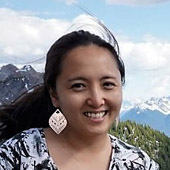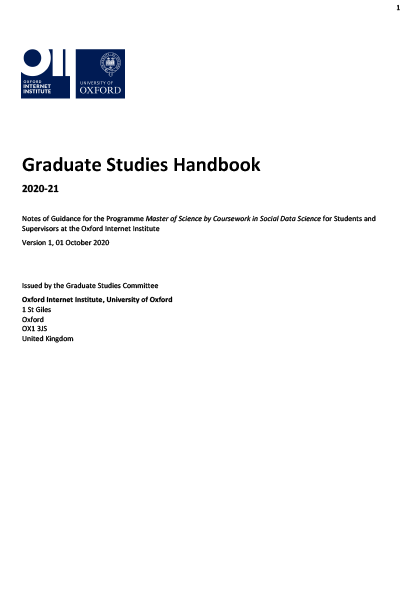Start date: October 2026
Duration: 10 months (full-time)
Location: Oxford
Deadlines: Friday 14 November 2025 and Friday 9 January 2026


Start date: October 2026
Duration: 10 months (full-time)
Location: Oxford
Deadlines: Friday 14 November 2025 and Friday 9 January 2026

Explore how data and the people behind it shape our world with the MSc in Social Data Science.
Delivered by the Oxford Internet Institute’s world-leading multidisciplinary faculty, this intellectually rigorous programme equips students with applied expertise in rapidly advancing domains in machine learning, coupled with theories, practices, and research focus from the social sciences.
Whether your goal is doctoral study, a career in data science, policy or tech innovation, this programme offers a unique opportunity to engage with cutting-edge research and real-world applications in a dynamic academic environment.





The MSc combines core training in social science theories, research design, and quantitative and computational methods with specialist options and a thesis project.
Students select two option papers. Please note that not all options run every year.
An independent research project of up to 12,000 words, supported by seminars and supervision, allows students to apply their learning to a topic of their choice.
2024
2023
2022
The MSc programme runs from October to August. Oxford University terms are referred to as Michaelmas term, Hilary term, and Trinity term and each last eight weeks.
| Michaelmas Term | Hilary Term | Trinity Term |
|---|---|---|
|
|
|
The Oxford Internet Institute is located in the newly opened Schwarzman Centre. Students benefit from:

Our students come from a wide range of disciplines, backgrounds, and perspectives. We believe that meaningful insight into digital society depends on a diversity of thought and lived experiences.
I wanted to focus more on the social science side of quantitative research and loved how the OII fosters a culture where research connects to interdisciplinary theories. The diversity of background in our cohort meant we were constantly learning from each other about methods across fields and applying them in creative ways.
Mimi Chen
former MSc student

The OII’s strength is in its multidisciplinarity. In my cohort, we had people from law, linguistics, sociology, political science, economics, maths, statistics and more. We learned from each other, borrowing methodologies across fields and applying them in new ways.
Carla Intal
former MSc student

Hear from our students in their own voices what it’s like to study at the OII:






Graduates of the MSc in Social Data Science go on to careers in:
The programme’s strong emphasis on critical thinking and cutting-edge research methods prepares students for impactful roles in a rapidly evolving digital landscape.
Applications are submitted via the University of Oxford Graduate Admissions portal. Applications must be complete by the deadline, including references.
Applicants interested in continuing on to doctoral study should include an ESRC Grand Union DTP application for 1+3 funding as part of their MSc application.
Details on tuition fees, living costs, and funding opportunities are available on the University’s Fees and Funding page.
Scholarships include:
One of Oxford’s most prestigious funding schemes, Clarendon offers around 170 fully funded scholarships annually to exceptional graduate applicants. Covering tuition and living expenses, the scholarship also provides access to a vibrant academic and professional network. The Oxford Internet Institute nominates candidates during the admissions process. Further details of this scholarship can be found on the University’s Clarendon Scholarships page.
This studentship supports MSc applicants intending to continue on to doctoral research at the OII.
The Economic and Social Research Council (ESRC) is the UK’s largest organisation for funding research on social and economic issues. Oxford, in collaboration with Brunel University and the Open University, hosts the ESRC Grand Union Doctoral Training Partnership.
The funding is available via two routes: 1+3 (MSc to DPhil) and +3 (DPhil only), for both full-time and part-time students. Applicants must submit a Grand Union DTP application alongside their graduate application. Please ensure you have read all of the guidance available on the Grand Union DTP website before completing the Grand Union DTP Application Form. Questions can be directed to the Grand Union DTP Office.
The OII welcomes a number of Rhodes and Marshall Scholars onto the MSc programme every year. Eligible students should apply for these scholarships before applying for a place on the MSc programme.
Oxford offers several targeted scholarships to support underrepresented groups:
Find out more about Academic Futures
The Weidenfeld-Hoffmann Scholarships and Leadership Programme combines graduate study with leadership development, mentoring, and networking. To be considered for this scheme, applicants must select the Weidenfeld-Hoffmann Scholarships and Leadership Programme in the University of Oxford Scholarships section of the University’s graduate application form.
The OII awards a limited number of MSc Scholarships supported by the Shirley Scholars Fund which was established in honour of OII founder donor Dame Stephanie Shirley. These departmental scholarships are open to all MSc applicants.
Download the handbook for study in the academic year 2025-2026

The MSc in Social Science of the Internet focuses on the societal impact of digital technologies, using a mix of qualitative, quantitative, and computational methods. The MSc in Social Data Science is geared towards students with strong quantitative skills who want to apply advanced techniques like machine learning to analyse human behaviour and social phenomena.
Applications in both deadlines are given equal consideration, so please choose the deadline that works best for you. The main difference is that applicants applying in November receive an earlier decision. Start early to ensure your application, including references, is complete by your chosen deadline. Apply via the University of Oxford Graduate Admissions site, here is a guide to getting started.
If you already have English language test scores at the required level achieved within two years of the start of the course to which you are applying, please include them in your application. However, you are not required to provide test scores when you submit your application. If you receive an offer of a place, you will be required to submit language test scores by a specific deadline as a condition of your offer. See the application guide for details.
You will be assigned a general supervisor in your first term. In the second term, based on your research interests, you’ll be matched with a thesis supervisor. The department provides resources such as topic booklets and faculty introductions to support this process.
Course fees cover tuition and academic services and facilities, but not accommodation or living costs. Oxford combines tuition and college fees into a single figure. See the University’s fee guidance and living cost estimates for budgeting.
Full-time students are required by the University’s regulations to be in residence in Oxford for each of the 8 weeks of Michaelmas, Hilary and Trinity terms. You will be free to leave Oxford after the end of each term but are advised to return during the week prior to the start of the next term (referred to as 0th week).
We do not currently offer any of our MSc or DPhil programmes online, and the MSc in Social Data Science is only offered in a full-time mode due to the intensive nature of several of the core courses. The DPhil in Social Data Science is offered in both full-time and part-time modes, and our MSc in Social Science of the Internet is offered part-time.